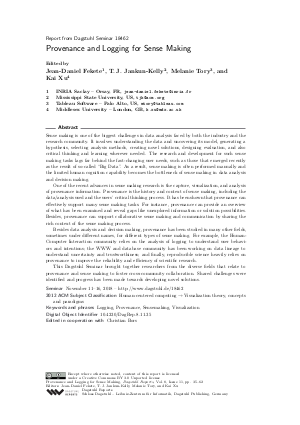Provenance and Logging for Sense Making (Dagstuhl Seminar 18462)
Authors Jean-Daniel Fekete, T. J. Jankun-Kelly, Melanie Tory, Kai Xu and all authors of the abstracts in this report
-
Part of:
Issue:
Dagstuhl Reports, Volume 8, Issue 11
Part of: Volume: Dagstuhl Reports, Volume 8
Part of: Journal: Dagstuhl Reports (DagRep) - License:
 Creative Commons Attribution 3.0 Unported license
Creative Commons Attribution 3.0 Unported license
- Publication Date: 2019-04-10
File

PDF
DagRep.8.11.35.pdf
- Filesize: 3.4 MB
- 28 pages
Document Identifiers
Subject Classification
Keywords
- Logging
- Provenance
- Sensemaking
- Visualization
Metrics
- Access Statistics
-
Total Accesses (updated on a weekly basis)
0PDF Downloads0Metadata Views
Abstract
Sense making is one of the biggest challenges in data analysis faced by both the industry and the research community. It involves understanding the data and uncovering its model, generating a hypothesis, selecting analysis methods, creating novel solutions, designing evaluation, and also critical thinking and learning wherever needed. The research and development for such sense making tasks lags far behind the fast-changing user needs, such as those that emerged recently as the result of so-called "Big Data". As a result, sense making is often performed manually and the limited human cognition capability becomes the bottleneck of sense making in data analysis and decision making. One of the recent advances in sense making research is the capture, visualization, and analysis of provenance information. Provenance is the history and context of sense making, including the data/analysis used and the users' critical thinking process. It has been shown that provenance can effectively support many sense making tasks. For instance, provenance can provide an overview of what has been examined and reveal gaps like unexplored information or solution possibilities. Besides, provenance can support collaborative sense making and communication by sharing the rich context of the sense making process. Besides data analysis and decision making, provenance has been studied in many other fields, sometimes under different names, for different types of sense making. For example, the Human-Computer Interaction community relies on the analysis of logging to understand user behaviors and intentions; the WWW and database community has been working on data lineage to understand uncertainty and trustworthiness; and finally, reproducible science heavily relies on provenance to improve the reliability and efficiency of scientific research. This Dagstuhl Seminar brought together researchers from the diverse fields that relate to provenance and sense making to foster cross-community collaboration. Shared challenges were identified and progress has been made towards developing novel solutions.
Cite As Get BibTex
Jean-Daniel Fekete, T. J. Jankun-Kelly, Melanie Tory, and Kai Xu. Provenance and Logging for Sense Making (Dagstuhl Seminar 18462). In Dagstuhl Reports, Volume 8, Issue 11, pp. 35-62, Schloss Dagstuhl – Leibniz-Zentrum für Informatik (2019)
https://doi.org/10.4230/DagRep.8.11.35
BibTex
@Article{fekete_et_al:DagRep.8.11.35,
author = {Fekete, Jean-Daniel and Jankun-Kelly, T. J. and Tory, Melanie and Xu, Kai},
title = {{Provenance and Logging for Sense Making (Dagstuhl Seminar 18462)}},
pages = {35--62},
journal = {Dagstuhl Reports},
ISSN = {2192-5283},
year = {2019},
volume = {8},
number = {11},
editor = {Fekete, Jean-Daniel and Jankun-Kelly, T. J. and Tory, Melanie and Xu, Kai},
publisher = {Schloss Dagstuhl -- Leibniz-Zentrum f{\"u}r Informatik},
address = {Dagstuhl, Germany},
URL = {https://drops.dagstuhl.de/entities/document/10.4230/DagRep.8.11.35},
URN = {urn:nbn:de:0030-drops-103554},
doi = {10.4230/DagRep.8.11.35},
annote = {Keywords: Logging, Provenance, Sensemaking, Visualization}
}
